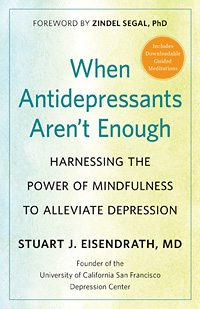
An excerpt from When Antidepressants Aren’t Enough by Dr. Stuart Eisendrath
Seventeen years ago, Dr. Stuart Eisendrath piloted research into the therapeutic effects of mindfulness-based cognitive therapy (MBCT) on people experiencing clinical depression. Ever since, he has been helping those who struggle with depression dramatically improve their symptoms and quality of life by changing how they relate to their thoughts and feelings.
In When Antidepressants Aren’t Enough: Harnessing the Power of Mindfulness to Alleviate Depression (New World Library, October 1, 2019), Dr. Eisendrath outlines an easy-to-implement MBCT program that has been scientifically proven in a National Institute of Health study to bring relief to chronic sufferers of depression by helping them realize that their thoughts are not their reality. We hope you’ll enjoy this except from the book.
The mind tends to do things it is particularly good at: thinking, problem solving, worrying, judging, and analyzing. But these things are often not in your best interest. It’s somewhat like reading an article from a website or newspaper. What is written may not be accurate. If you suffer from depression, memories and thoughts tend to be biased toward the negative, which diminishes your problem-solving abilities. These factors may lead to misinterpretations, inaccurate assessments, and inappropriate decision making.
For example, Carol was walking down the street and saw a friend walking the other direction on the other side of the street. She waved to her but got no response. She felt rejected and depressed. Only later did she learn that her friend had been preoccupied by some bad news about a problem in her own life and hadn’t noticed Carol. As she later learned, her friend was watching for an important business email she’d have to respond to.
Bill assessed himself as being incapable of completing a marathon. Only after joining a special training program did he realize he could be successful.
Sam thought of refusing a promotion, because he thought his boss was setting him up to fail rather than having confidence in his ability to handle the new position. Such an approach could have severe consequences for his career.
A key step in coping with such thoughts is trying to decide if such situations are facts or just thoughts. Mindfulness gives you the space to look at the situation from multiple perspectives and without judgment. Then you can decide how to respond to the situation skillfully. You can evaluate your thoughts in several ways. One is to hold back on acting on a thought while you gather more data to assess whether the thought is a valid one. Another way of assessing a thought is to ask yourself how you feel in thinking it. If you feel more depressed (for example, “Yes, my friends really don’t like me”), there is a very good chance the thought is being driven by depression.
One time, I was teaching a beginning class in meditation. One woman said, “I can’t meditate as well as everybody else here.” This is one of the most common thoughts of beginning meditators. Then several other members of the group expressed a similar idea about themselves. I asked them how they knew this, and as we assessed the situation, it became clear that such a thought was based more in the critical voice of depression rather than in any fact. Since none of the members had had any prior experience with meditation, it would be hard to expect anyone to be “better” than anybody else. Moreover, there actually is no competition in meditation; there is no score as in a game of basketball or golf. Mindful meditation is more about being present than about doing something better or worse than someone else.
So the woman’s thought that she was somehow worse than others in her meditation practice was a valuable lesson about how her mind generated negative thoughts that were unnecessarily critical of her. She could begin to label them as such and become more able to bring her attention back to a neutral object like her breath. Perhaps just as important, when she was able to recognize such thoughts for what they were, she would not feel compelled to act on them by doing something such as dropping the class.
Stuart Eisendrath, MD, is the author of When Antidepressants Aren’t Enough and the founding director of the University of California San Francisco Depression Center. Visit him online at www.stuarteisendrath.com.
Excerpted from the book When Antidepressants Aren’t Enough. Copyright ©2019 by Stuart Eisendrath. Printed with permission from New World Library.
